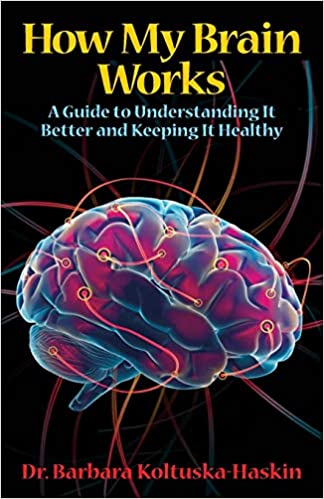How My Brain Works – Menopause And Memory – Art of Healthy Living
The brain is the most complex organ in our body. From the physical actions of movement, balance, control and co-ordination, the life essential functions of breathing, swallowing, blood pressure and heart beat, to the mental controlling of speech, memory, intelligence, decision making and even helping to shape personality and create the essence of who we are as a person; the brain is in charge of everything that happens inside our body.
As we navigate through life, just as our body grows and changes so too does our brain. And of course we all want to be able to reach our full potential and to live the most purposeful, satisfying, and successful life we possibly can. Dr. Barbara Koltuska-Haskin is a practicing neuropsychologist and author of the book How My Brain Works: A Guide to Understanding It Better and Keeping It Healthy. In her book she explains in easy-to-understand language the range of neuropsychological evaluation processes she uses on the wide variety of clients she has helped and then guides us through a series of tips to help build and to maintain optimum brain health as we navigate our way through life.
Dr Barbara has kindly shared an extract with us from her chapter all about menopause and memory, something I know many of you, including myself, are interested in.
Chapter 16 – Menopause and Memory
Memory and other cognitive problems experienced by women during menopause are real and appear to be more acute during the first year following the final menstrual period (Weber, M. T. et al. 2013). The changes in hormones and natural decline of estrogen affect all women’s bodies, including their brains. Learning and memory are associated with those regions of the brain (hippocampus and prefrontal cortex) that are rich in estrogen receptors. Women may complain of “fuzzy thinking” (Northrup, C. 2002) or “cotton head,” an inability to think straight, organizational problems, attention/concentration problems, mood swings, and depression. These usually aren’t symptoms of dementia, and usually memory does return to normal for the person’s age. However, about 5 percent of women above the age of sixty have some form of dementia. After the age of seventy, it’s 12 percent, and the percentage is higher as you get older. I strongly agree with Dr. Northrup, who said, “Women need to know that statistical data on dementia cannot predict whether any particular woman will develop memory problems.” (Northrup 2002, p. 566).
“I may have the beginning of dementia.”
Janet was a fifty-three-year-old nurse, tall and elegantly dressed, who was referred to me by her physician. Visibly anxious, she stated with tearful eyes and trembling voice, “I may have the beginning of dementia.” When asked detailed questions about her current problems, she reported that she had been forgetful for the past few months and was making stupid mistakes at work. She didn’t have a family history of Alzheimer’s dementia or any other forms of dementia. However, the husband of her best friend was recently diagnosed with the early stage of Alzheimer’s dementia. She noticed him having memory problems, and she was afraid that she could be experiencing some of these problems as well.
After talking to her for a while to make her feel more comfortable, I explained that memory complaints aren’t necessarily memory problems and told her what kind of testing we would be doing to address her concerns. I mentioned that most patients with dementias have problems with judgment and insight, and they tend to be in denial about their memory and other cognitive problems. They’re mostly brought for evaluation by family members who see changes in their functioning. These changes are frequently not obvious to the patients themselves.
This made her feel more comfortable and eager to start testing. She mentioned that she had been menopausal for the past year and wondered if this might have something to do with her difficulty with cognitive functioning.
After testing was completed, it turned out that her memory was generally within the normal range for her age group, and her verbal memory was even above the normal range. She exhaled with relief. I explained to her that some menopausal women experience memory and cognitive problems, especially for the first year, but it usually comes back to normal. Therefore, her memory may have been somewhat higher before menopause, but at present, there was no reason for her to worry. She was advised that we got good baseline results for her memory functioning, and if she had concerns in the future, she could return for retesting. She might also benefit from therapy to help her deal with anxiety and stress at work. She called several weeks later thanking me and telling me that she was doing much better.
Janet’s story isn’t that uncommon.
In my clinical practice, I see several middle-aged women a year who are experiencing memory problems and are afraid they’re having the beginnings of dementia. The fear of losing their mind and being unable to function in the future causes them sadness, depression, and insomnia and significantly affects their quality of life. So if you experience this problem, instead of dwelling on the unknown, you can discuss with your physician or other health care provider whether you can benefit from completing a neuropsychological evaluation. The memory tests have specific norms for every age. The evaluation will help to find out if, in fact, you have memory problems or merely memory complaints and what kind of memory, verbal, or visual or which memory processes, retentive memory or encoding, are affected. This specific information will allow the neuropsychologist to give you detailed information as to what you can do to improve your overall functioning and the quality of your life.
Please remember this:
Most of the time you can improve your brain functioning, even after a major neurological event or illness.
You simply need to find the best and most effective way of doing it with the help of your health care professionals. Take the example of Dr. Jill Bolte Taylor, a neuroscientist who recovered quite well after a massive stroke and wrote a fascinating book, My Stroke of Insight: A Brain Scientist’s Personal Journey (2008).
Where Can I Find Out More?
Dr Barbara’s book ‘How My Brain Works: A Guide to Understanding It Better and Keeping It Healthy’ is available in either paperback or eBook format from Amazon https://www.amazon.com/How-My-Brain-Works-Understanding/dp/1948749610
You can also find out more about Dr Barbara’s work here – https://www.drkoltuska.com/
*collaborative post
Author Bio

Dr. Barbara Koltuska-Haskin is a neuropsychologist in private practice in Albuquerque, NM. In addition to her research and academic teaching background, she has over 30 years of clinical experience.
She is a classically trained mezzo-soprano with a deep love for organic gardening.
This article was originally published by artofhealthyliving.com. Read the original article here.




